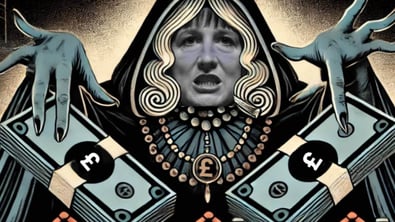The UK is about to enter a recession, as the cost of inflation hits. The UK statistics body, as reported by BBC News, said “higher prices are beginning to bite, with people spending less and cutting down on car journeys due to higher fuel costs”.
The impact of a recession on the property market can be wide-ranging, and it is important that you keep up to date with our blog posts and YouTube channel to stay on top of everything you need to know.
This blog post will explain what we know so far and the potential impact a recession would have on property.
How does a recession affect the property market?
There are lots of areas within the property market, we’ll take a look at these in detail.
According to Experian, “Economic recessions typically bring low-interest rates and create a buyer’s market for single-family homes. As long as you’re secure about your ability to cover your mortgage payments, a downturn can be an opportune time to buy a home.”
During a recession you might expect to see increases in rates of foreclosure, and flat or even declining property values in the short-term, this can create opportunities for buyers who are able to convince lenders they can afford to keep up with loan payments.
Benefits of buying a house during a recession
- Lower interest rates: Often during a recession, the Bank of England will lower interest rates to prompt spending on the economy – which means a lower total cost over the life of a home purchase.
- Less buying competition: Economic downturns mean fewer people have the means to buy a first home or upgrade to a larger one. Dependent on where you’re shopping for a house and the type you desire, you will have fewer rivals fighting against you. It can give you more time to shop around and find the properties you desire.
- Lower home prices: Fewer buyers in the market might cause a home seller to lower their price to make the property more appealing. For sellers in a hurry, the lack of a selling cycle can prompt them to reduce the price to ensure a quick sale.
The Housing Market in The Great Recession and Coronavirus Pandemic
The issues in 2007-08 were caused by the “deliberately obscure financial securities directly tied to subprime mortgages.”
Homebuyers were issued credit without adequate risk management.
“Subprime mortgages are financial instruments with widely varying terms that lenders offer to risky borrowers. A risky borrower might have a less than stellar credit history, questionable income stability, and high debt-to-income ratio.”
The housing market did get back on its feet, with prices increasing from £186,000 in November 2013 to £244,000 in April 2019.
The impact of the Covid-19 pandemic on housing, despite the UK being plunged into the deepest recession since World War II were mind-blowing.
Nationwide reported that prices in 2021 were 11% higher than the year previous. Britain’s biggest homebuilder, Barratt Development, announced profits had almost doubled to £812m over the same period.
The Resolution Foundation thinktank said, “The demand for more spacious properties during the pandemic and the pent up savings of those kept in work by the furlough scheme was enough to spur buying activity without extra incentives from the Treasury.”
This demand is still extremely high. The market was also aided by people seeking a change of scenery after considerable time being kept indoors.
What will happen to property in 2022?
Unbiased.co.uk has said that in 2022 “the shortage of affordable and available housing will play a major role in keeping house prices high. With so much competition and limited supply of housing, prices are unlikely to level off.”
What will happen to the Buy To Let market during a recession?
The Bank of England has predicted that inflation will hit 10% by the end of 2022.
National World says despite this, property prices have risen consistently for four months – the longest steady price increase for six years.
Low mortgage rates are driving the market, but there is concern that the recession and the potential for job losses will put people off buying outright.
The CEO of a national property management company said that recessions can be extremely good for owners of rental properties.
Aaron Marshall of Keyrenter Property Management told Forbes, “When recessions happen, housing is often affected, and when people can’t afford to buy homes, they rent.
“It is possible to have things go south with rental property in a recession. You could have your tenants unable to pay and they leave, and then you have trouble filling vacancies – and you might even have to lower your rent to entice people to move in.
“But you’re likely to only going to have problems finding tenants if you’ve let the place go. Generally, if you have a property that’s well run, you’re going to keep – and that rental income may turn out to be your bulwalk in an economic storm. You may find that with a business, you have to lower prices and profits and sales may be down. But if you have reliable tenants, month after month, you’ve got a steady income to protect you and prop you up in a recession.”
What will happen to serviced accommodation during a recession?
A recession could also increase demand for staycations and prompt a serviced accommodation boom.
The Guardian reported in 2009, as the 2007-08 global crisis impacted, that trips abroad by UK residents slumped 17% in the first half of the year as consumers traded international beaches for the British Isles.
“All the information we are getting indicates when people are looking to reduce spending, their holiday tends to be the last thing they cut,” said Elliott Frisby from Visit Britain. “But they do seem to be trying to reduce the cost, for example staying in their own country, and that seems to be helping the domestic market.”
The Camping and Caravanning Club saw bookings rise by almost a third year-on-year and recruited 100,000 new members over the period.
In 2013, Travelodge did an investigation on the recession’s impact on tourism. It found:
- Total tourism revenue up 12.6% to £40bn between 2007-2011
- Total visitors up 3.1% to 157m
- Fewer Britons holidaying abroad, down 18%
- Staycation breaks up 5.6%
- UK city breaks account for 23% of domestic tourism
Ultimately, it meant that tourism outperformed the general economy during the period.
While GDP grew by 8% from 2007 to 2011, during the same period the tourism industry increased its revenue by 12.6% to more than £40 billion and increased visitor numbers by 3.1%.
British Tourism was one of the few sectors not to see jobs decline from 2007 to 2011, which is impressive considering that overall UK employment rose from 1.58 million to 2.64 million during the period.
Conclusion
Despite the potential of the recession, there is plenty to be opportunistic about.
For buying properties, the “Ryainair model” of investing in stock whilst there is less buying demand can create dividends in the long run. The property market has proven time-and-time-again that it can boom again following a recession.
In the short term, residents may find renting more attractive which provides a fantastic opportunity for buy-to-let owners, who due to the economic situation are unable to obtain a mortgage themselves.
It is also ideal for Serviced Accommodation as there is a greater shift on staycations, backed by the data from the previous recession.
Wealth Through Property is the UK’s premium property investment course. Set over two days the course will teach you about the latest strategies and what is working, educate yourself in the different methods needed to get your portfolio started and have greater diligence over your finances and manage yourself at a personal level.
To find out more information and to start or take the next steps on your property journey, call us on 01302 897131 or email office@touchstoneeducation.co.uk.












